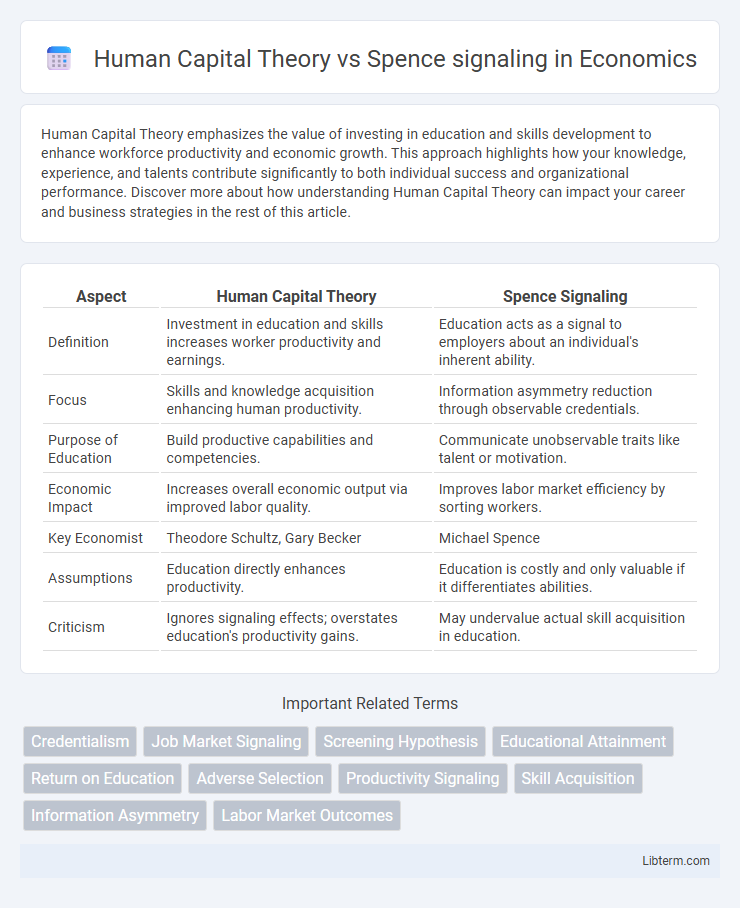Human Capital Theory emphasizes the value of investing in education and skills development to enhance workforce productivity and economic growth. This approach highlights how your knowledge, experience, and talents contribute significantly to both individual success and organizational performance. Discover more about how understanding Human Capital Theory can impact your career and business strategies in the rest of this article.
Table of Comparison
| Aspect | Human Capital Theory | Spence Signaling |
|---|---|---|
| Definition | Investment in education and skills increases worker productivity and earnings. | Education acts as a signal to employers about an individual's inherent ability. |
| Focus | Skills and knowledge acquisition enhancing human productivity. | Information asymmetry reduction through observable credentials. |
| Purpose of Education | Build productive capabilities and competencies. | Communicate unobservable traits like talent or motivation. |
| Economic Impact | Increases overall economic output via improved labor quality. | Improves labor market efficiency by sorting workers. |
| Key Economist | Theodore Schultz, Gary Becker | Michael Spence |
| Assumptions | Education directly enhances productivity. | Education is costly and only valuable if it differentiates abilities. |
| Criticism | Ignores signaling effects; overstates education's productivity gains. | May undervalue actual skill acquisition in education. |
Introduction to Human Capital Theory and Signaling
Human Capital Theory emphasizes investment in education and training to enhance an individual's productivity and earnings potential. Spence's Signaling Theory suggests that education serves as a signal to employers about a candidate's underlying abilities rather than directly increasing productivity. Both theories explain labor market dynamics but differ in interpreting the role and value of education.
Historical Background of Human Capital Theory
Human Capital Theory emerged prominently in the 1960s through the work of economists like Gary Becker and Jacob Mincer, who emphasized investments in education, training, and health as critical drivers of economic productivity. This theory conceptualizes human skills and knowledge as forms of capital that enhance individual earning potential and contribute to overall economic growth. It contrasts with Spence's signaling model, which centers on education as a mechanism for signaling ability rather than improving productivity directly.
Spence’s Signaling Theory Explained
Spence's Signaling Theory explains how individuals use educational qualifications as signals to convey their innate abilities and productivity to employers in job markets where information asymmetry exists. Unlike Human Capital Theory, which views education as a direct investment that enhances skills and productivity, signaling theory emphasizes education as a means to distinguish high-ability candidates from low-ability ones. This theory highlights the role of credentials in reducing uncertainty for employers during the hiring process.
Key Assumptions of Human Capital Theory
Human Capital Theory assumes individuals invest in education and training to increase their productivity and future earnings, viewing knowledge and skills as capital assets that enhance economic value. This theory presupposes that employers can accurately assess this acquired human capital through observable factors like qualifications and experience, directly linking investment in education to improved job performance. It contrasts with Spence signaling, which emphasizes education as a signal to employers about inherent abilities rather than a direct productivity enhancer.
Core Principles of Spence’s Signaling Model
Spence's signaling model centers on the idea that education serves as a signal to employers about a worker's inherent ability rather than necessarily enhancing productivity. The core principle involves individuals acquiring costly signals, such as degrees, that are easier for high-ability workers to obtain than low-ability workers, creating separating equilibria in the labor market. Employers interpret these signals to make informed hiring decisions despite asymmetric information regarding candidates' true capabilities.
Education’s Role: Investment or Signal?
Human Capital Theory views education as a direct investment that enhances an individual's productivity and skills, leading to higher earnings and economic growth. In contrast, Spence's Signaling Theory argues that education primarily serves as a signal to employers of inherent abilities rather than directly increasing productivity. The debate centers on whether education's value lies in skill acquisition or its role in signaling hidden traits to the labor market.
Differences in Predicting Labor Market Outcomes
Human Capital Theory predicts labor market outcomes based on an individual's accumulated skills, education, and experience, emphasizing productivity as the key determinant of wages and employment opportunities. Spence's Signaling Theory argues that education serves primarily as a signal to employers regarding an applicant's inherent ability or traits, rather than directly increasing productivity. While Human Capital Theory links education to enhanced job performance and economic returns, Signaling Theory views educational credentials as a filtering mechanism that influences employer perceptions and hiring decisions.
Empirical Evidence: Which Theory Holds?
Empirical evidence shows mixed results when comparing Human Capital Theory and Spence signaling in labor market outcomes. Studies indicate that investments in education often enhance productivity, supporting Human Capital Theory, while other research highlights signals like credentials that reduce information asymmetry, aligning with Spence signaling. Meta-analyses reveal that the explanatory power varies by context, suggesting both theories contribute valuable insights to understanding wage differentials and hiring decisions.
Criticisms and Limitations
Human Capital Theory faces criticism for its assumption that education directly increases productivity without adequately accounting for external factors like labor market imperfections and discrimination. Spence's signaling theory is limited by its reliance on costly signals that may not consistently correlate with actual productivity, potentially leading to inefficiencies in hiring. Both theories overlook the complexity of skills acquisition and the multifaceted nature of employer decision-making in real-world labor markets.
Implications for Policy and Practice
Human Capital Theory emphasizes investment in education and training to enhance workers' productivity, suggesting policies that increase access to quality education and skills development programs. Spence Signaling Theory highlights the role of educational credentials as signals to employers about worker ability, indicating the need for policies that ensure credential transparency and reduce information asymmetry in labor markets. Combining both approaches in practice encourages balanced strategies that promote skill acquisition while addressing employer trust and labor market signaling efficiency.
Human Capital Theory Infographic

 libterm.com
libterm.com